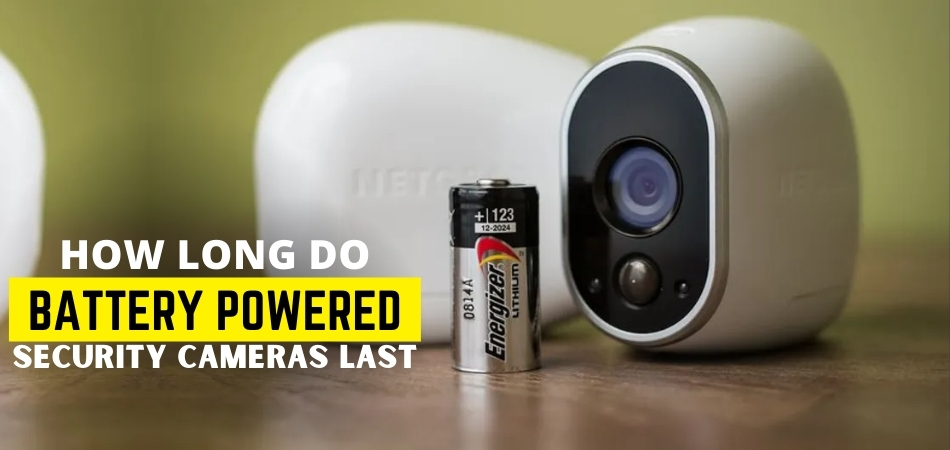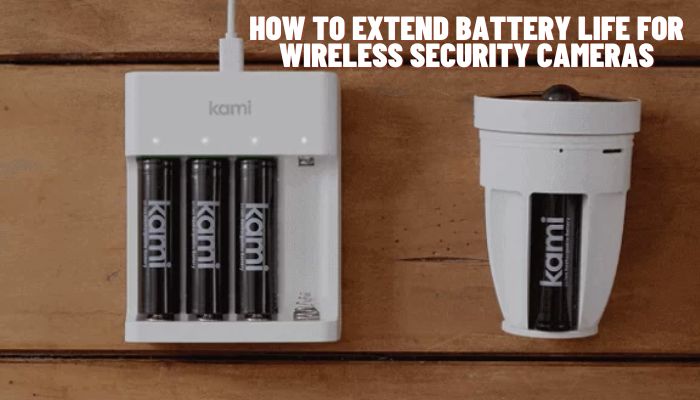Michael started his professional career as a security-camera technician. Later, he started his own business of security-camera service, and it's been a decade that he’s...Read more
Battery powered security cameras are becoming the order of the present-day CCTV systems. They come with special lithium-ion batteries. The longevity of a battery-powered security camera is based on its capacity, camera type, and usage.
Regardless of the backup duration of the wireless security camera, it is important to understand the processes involved to maximize its battery life.
So, how long do battery powered security cameras last? Although a typical security camera battery would last for 3 to 6 months, you can get some lasting a year, even up to 3 years in some cases.
But some factors also affect their overall running time, and they include, video quality, audio operation, frame rate, etc. As you continue in this guide, you will discover more detailed information on battery technologies and backup time as a subsequent output. We’ll also share some tips on how you can extend that.
Quick Navigation (Key Takeaways):
- The extent to which a security camera battery would last depends mainly on the capacity and usage of the battery. However, a typical wireless camera battery may last for 6 months. At its best, it can stay up to 3 years, depending on its capacity and usage.
- Rechargeable batteries can last for up to 2 to 6 months, while non-rechargeable batteries get up to 3 to 6 months on average.
- To extend the battery life of your security cameras, you should ensure a healthy Wi-Fi connection, and include a solar panel in the setup of the outdoor security cameras. Furthermore, avoid using Apple’s HomeKit, use good motion zone settings to reduce motion detection, and optimize the settings of your video camera in detail.
Do Security Cameras Run on Batteries?
This is dependent on the type of security camera. Traditional cameras are usually powered by power cables. Some others run employing a transmitter. While that is true for most conventional security cameras, Modern-day security cameras are designed to run on special batteries that keep them on for months or even a couple of years.
There are 3 different wireless IP cameras that run on batteries. They include rechargeable battery-powered IP cameras, non-rechargeable battery-powered security cameras, and solar-powered wireless security cameras.
- Rechargeable Battery-powered IP Cameras: IP cameras that are powered by rechargeable batteries are more budget-friendly, as they don’t require constant replacement. Security cameras running on these batteries remain on even while they’re on charge.
- Non-Rechargeable Battery-Powered Security Cameras: They are the most commonly used security camera batteries. These batteries can last for several months.
- Solar-Powered Wireless Security Cameras: If you never want to run out of power, then the solar-powered wireless security cameras are your green spot. Through the solar panel of the security camera, the battery receives a consistent power supply, so you don’t have to bother about running out.
How Long Do Battery Powered Security Cameras Last?
An average non-rechargeable lithium-ion battery will last for up to 6 months. At best, battery-powered security cameras can stay on for a year or two, and sometimes up to three. There are two major factors, among others, that affect how long these wireless security cameras would last.
These factors may include the capacity of the battery and its usage.

Most lithium-ion batteries are renowned for their long-lasting power supply. However, over time, these batteries lose power and eventually die. Using such batteries on your security cameras may keep them running for up to three years tops. Let us consider some important factors that may affect the longevity of a battery powered security camera.
Factors that Affect the Battery Life of A Wireless IP Camera
As you may already know, the camera type is not the only factor that affects the battery life of a wireless security camera. The usage is another major factor to consider. When we talk about the usage, we are referring to the configurations or settings enabled in the system. More to this is the location of the security cams.
Rate of Compression
Compression is an aspect of the cam system that drains the life of the battery. Compression technology demands more application of computation. But keeping your cam recording at H.265 (HEVC) reduces the consumption rate on the battery. The normal setting for compression rate is higher than this, which drains the battery somewhat faster than the H.265.
Video Quality
The video quality settings play an important role in maximizing the battery life of the cameras. Recording with a video resolution set at 2K in place of 4K helps to maximize the up-time of the cams.
Frame Rate
You can find Frame Rate in gaming as well. What this means in cam recording is that the higher the frame rate, the more demand on the battery. Therefore, keeping a low frame rate will help you maximize the uptime of the battery.
IVS Technology
The function of all the features of the IVS (Intelligent Video Surveillance) also reduces the life of the battery. The intensity of the coding here also determines the battery consumption rate.
Audio Operation
The audio operation in the camera system, such as the siren, two-way talk, and audio recording also consume the power of the battery. The speaker and mic placements are responsible for the frequency of this operation.
Other Activities and Regular Recording
Setting the camera recordings at Sound or Motion-activated in place of that of the 24 hours helps to control battery usage. This is the reason most security cameras capture short clips.
Weather Condition
The battery life drains faster in intense weather conditions. As such, you may notice quicker battery drain in the winter seasons. This is one factor you may not be able to curb.
What Type of Rechargeable Battery Is Best for Security Cameras?
The main types of rechargeable batteries ideal for security cameras include Lithium-ion batteries and Nickel-metal hybrid batteries. There are several other types of rechargeable batteries, but not all are suitable for a wireless security camera. These batteries include Nickel-Cadmium (NiCd), rechargeable alkaline batteries, and Lithium-ion Polymer (LiPo).
Lithium-ion Batteries
Benefits
Battery packs that are powered by lithium cells usually give off excellent capacity with adequate voltage, thereby producing high-energy-density. Lithium-ion batteries are not only ideal for your security cameras, they are a perfect choice for medical devices, cell phones, electric vehicles, etc.

Lithium-ion batteries have lighter weight and most times they don’t come in large sizes. They are designed to dissipate high voltage while maintaining a relatively low self-discharge rate. The lithium-ion batteries are suitable for your wireless IP cameras because they don’t take long to recharge. More to this is the high tolerance to fairly high temperatures they possess.
Disadvantages
There are a few caveats to these types of batteries. Out of which are the limited compatibility and low internal capacity. What’s more, the battery is vulnerable to damage given its inability to completely discharge.
Nickel-Metal Hydride Batteries
Benefits
Nickel-metal hydride batteries are renowned for their safety of use. This is because of the reduced quantity of active materials that make up the batteries. Also, they possess good energy density, which is the driving power of technology. This is a result of their reliability, good-life performance, and environmentally-friendly record.

The major strength of these batteries is their compatibility and energy density. This is what makes the Nickel-metal hydride batteries one of the best choices for wireless security cameras. Compared to lithium-ion batteries, Nickel-metal hydride batteries possess higher milliamps per hour.
Unlike lithium-ion, Nickel-metal batteries come in several sizes, improving their compatibility.
Disadvantages
Although Nickel-metal hydride batteries offer many benefits of use, they have some drawbacks as well. These include their sensitivity to high temperatures, long charging time, and a high self-discharge rate. They are not suitable for low-charge gadgets.
How to Extend Battery Life for Wireless Security Cameras
There are many benefits one can get from wireless cameras, including their ease of operation. However, almost all battery-powered security cameras have a similar caveat, which is their battery life. Although the battery power of a security camera depends on its capacity and manufacturer, there are steps you can employ to extend its running time.

Some manufacturers usually overstate the total time their products last. And because they want you to purchase them, they give more optimism to the battery life. Fortunately, there’s a way to go about this. Here are some steps you can utilize to extend the battery life of your wireless security camera.
Ensure a Strong Wi-Fi Connection
One thing that could dwindle the battery life of a security camera is having an unreliable Wi-Fi connection. To solve this problem, install your security cameras close to the router. Avoid placing the cameras in areas distant from the location of the router and have good network coverage.
Here’s what happens when you place the cameras far from the router. The cameras take a longer time to get the Wi-Fi signal. This usually causes the battery to drain faster.
Include a Solar Panel in The Setup of The Outdoor Security Cameras
This is one way to maintain a consistent power supply for outdoor security cameras. It only takes a few hours of direct sunlight in a day to charge the cam’s battery. This way, you won’t need to worry about the batteries running out of power.
For this case, you need to focus more on the voltage and wattage of the solar panels. This is vital as they determine the amount of energy the solar modules generate.
Avoid Using Apple’s Home Kit
Apple’s HomeKit drains the battery life faster as it is always active. The framework is not ideal for wireless security gadgets or devices. In place of Apple’s HomeKit, Eufy app, Arlo app, or Ring app is preferable. Moreover, Apple’s HomeKit has special features that are only operational in the manufacturer’s application.
Use Motion Zone Settings strategically
The battery of any security camera works each time the cam records something. This makes it necessary to set the Motion Detection Zones or Activity Zones efficiently. Also, doing this keeps away too many notifications.
You can point the camera towards the door instead of a public place like a street or kids’ playground.
Optimize the Settings of Your Video Camera in Detail
Every security camera has motion sensitivity, people only, or human-only settings, aside from the good Motion and Activity Zones. Turning on these features increases the number of times the cam is engaged.
Other Measures
There are other measures you can take if the above fails, such as scheduling the period of the motion detection. This helps to maximize Wi-Fi security cams usage and conserve battery strength. Furthermore, you can replace the Spotlight feature with default night vision.
If you aren’t satisfied with this, you can use extreme measures, which may include:
- Shortening recording time for each video clip.
- Turn off the light or flash.
- Reducing the resolution of the security cameras if possible.
Conclusion
Now you should have a clear understanding of how long do battery powered security cameras last alongside what influences the lifespan. Although there’s no set duration for each camera you can find in the market, the general idea is anywhere from 3 months to 1 year, and 3 years in some cases.
That said, while getting your next camera, make sure the camera meets your expectation in terms of battery backup. On another note, you can get a camera that uses rechargeable batteries so that you don’t have to replace them every time they run out of charge.

Michael started his professional career as a security-camera technician. Later, he started his own business of security-camera service, and it's been a decade that he’s been doing it. There is simply nothing that he doesn’t know about security cameras and their accessories. He created this site Aimprivacy, to share his knowledge and decade of experience with people who don’t have any prior knowledge about security and spy cameras.
More Posts